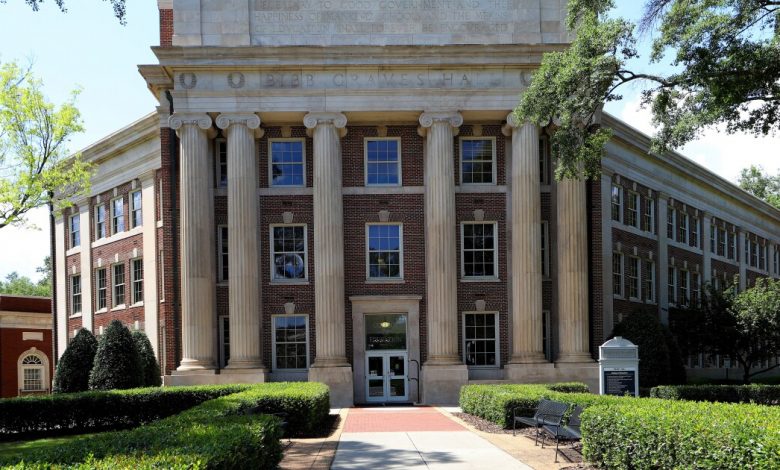U. of Alabama Reconsiders Keeping an Ex-Klansman’s Name on a Campus Building

[ad_1]
After a week of confusion and outrage across campus, the University of Alabama at Tuscaloosa will reconsider a decision to honor both the university’s first Black student and a former Ku Klux Klan leader on the same campus building.
Last week, the Alabama system’s Board of Trustees announced that Graves Hall, named for David Bibb Graves, a former governor and grand cyclops of the Klan’s Montgomery chapter, would be rechristened Lucy-Graves Hall. The new name commemorates Autherine Lucy Foster, who in 1956 became the first Black student to attend the university, and whose enrollment prompted a vicious backlash on campus. But the decision to keep Graves’s name alongside Foster’s sparked a present-day backlash.
On Wednesday afternoon, the trustees signaled that they were revisiting the decision. According to a statement provided by a university spokeswoman, the board will hold a meeting no later than Friday.
“The Board of Trustees is grateful for the input received from faculty, staff, students, alumni, and friends,” the statement said. The working group of trustees that crafted the new name “will continue to engage in respectful dialogue with those who have expressed feedback and will provide a recommendation to the Board of Trustees for its consideration.”
Alabama’s decision to adopt a hyphenated name for Lucy-Graves Hall, honoring two very different people, is unusual. To Amber Scales, a master’s student in communication at the campus, it “was the most bizarre thing.”
Six other public universities in Alabama have decided in the past two years to take Graves’s name off campus buildings.
Several faculty members said they were frustrated at the University of Alabama’s attempt to, as they see it, treat the naming decision as a both-sides issue — appeasing those who’ve called for the university to rename buildings, and those who’ve said that Graves’s legacy is still worth honoring.
“They thought by having both, they would satisfy all,” said Hilary N. Green, an associate professor of history in the department of gender and race studies. “I don’t think they satisfied anyone.”
‘Braided Narrative’
The Lucy-Graves Hall announcement came amid two years of national debate over campus building names. Some flagship universities in the South, like the University of South Carolina at Columbia and the University of Georgia, have preserved controversial building names, often in response to political pressure. Alabama has stood out, in other instances, for removing names and plaques that honor people who were slaveholders or held racist views.
At Alabama, recent naming decisions have been made by a “building-names working group” formed in June 2020 and composed of six of Alabama’s trustees, three of whom are African American. Judge John H. England Jr., a former Alabama Supreme Court justice and former trustee, served as the group’s chair.
According to the university, the working group met almost weekly, consulted with “more than a dozen historical scholars,” and listened to feedback. Over its two-year existence, the group recommended that seven building names be changed. The university’s website has little information about the working group, other than resolutions approved by the group and a final report, posted last week. A spokeswoman said the group provided regular updates in public Board of Trustees meetings.
But faculty members who spoke with The Chronicle said the naming process had lacked transparency. “The university needs to do a lot more explaining about how they came to this decision,” said Meredith Bagley, an associate professor of communication studies.
The university declined to make England available for an interview. During last week’s board meeting, England, who is Black, described Graves’s affiliation with the Klan, admitting that it was “hard for me to even say those words.” But Graves was known as a progressive leader, he said: “Some say he did more to directly benefit African American Alabamians than any other governor through his many reforms.”
England said the Lucy-Graves Hall decision was made in consultation with Foster’s family. Foster, now 92, told a local TV station that she “never expected to get that honor.” She said that she didn’t know much about Graves’s legacy. “Everybody can change,” she told the station. “Maybe he changed before he left this world.”

Bettmann Archive, Getty Images
Last fall, when announcing the decision to remove the name of William Hill Ferguson, a former trustee, from Alabama’s student center, England said that Ferguson’s racist views were at “odds” with the university system’s present-day values. For England and the working group, however, Graves’s past membership in the Klan was ultimately outweighed by the good he’d done.
In its final report, the group wrote that, while they “struggled to find a solution that seemed fitting and fair,” they concluded that the life of Autherine Lucy Foster “complements and completes” Graves’s life. “Together the stories of these two remarkable Alabamians help tell another one — of the UA system’s journey from a past marred by racial justice to its commitment today to diversity, inclusion, and mutual respect,” the group wrote.
Elsewhere, there’s at least one recent precedent for a blended name: The University of Richmond. Last year, Richmond’s Board of Trustees voted to combine two names on one building, resulting in Mitchell-Freeman Hall.
The name recognizes John Mitchell Jr., an African American newspaper editor, and Douglas Southall Freeman, a former university trustee who supported segregation. The board also voted to retain the name of Ryland Hall — after the Rev. Robert Ryland, who owned slaves — but said the university would name a terrace attached to the building after an enslaved person or people. A campus commission recommended the changes last year, and Ronald A. Crutcher, then Richmond’s president, embraced them.
Crutcher, the university’s first Black president, voiced support for a “braided narrative” that combined the university’s past and present history.
But University of Richmond leaders backtracked after students protested, saying last spring that they’d revisit the names again. A Richmond spokeswoman said another commission had been coming up with principles that the university would use to make future naming decisions. The commission plans to make recommendations by the end of the spring semester.
‘An Equal Place of Honor?’
Student activists have for years called for the University of Alabama to change building names that honored slave owners, Klan members, and others who held racist views. Several professors who spoke with The Chronicle credited students with leading the charge.
In Alabama and elsewhere, politics influences the conversations about building names. Republican state lawmakers nationwide have opposed calls to remove names from public universities, arguing that such moves amount to political correctness and the erasure of history. Faculty members said that Alabama’s leaders are most likely wary of inflaming tensions with the conservative legislature. A university spokeswoman denied that politics played a role.
To Julia Brock, an assistant professor of history, the explanation for retaining Graves’s name doesn’t make sense — especially given that the board voted to remove other problematic names.
“I’ve been thinking about the meaning of a hyphen. What does a hyphen do?” Brock said. “In this case, it’s the grammar of combination — it joins. Why are we joining these two people in an equal place of honor?”
Autherine Lucy’s initial tenure on campus in 1956 lasted only a few days. She often hid in a tunnel as riots and protests exploded, and then she was expelled. Lucy married Hugh Foster later that year. She returned to Tuscaloosa decades later and earned her master’s degree in 1992, graduating alongside her daughter, who finished her bachelor’s degree at the same time.
Bagley, the communication-studies professor, is glad that there’s been momentum over the past few years around commemorating Foster and grappling with the university’s history. Bagley helped lead efforts to put a historical marker honoring Foster on the campus. Thanks to campus advocacy, especially from the Black Faculty and Staff Association, the university has in recent years expanded its public acknowledgment of Foster, Bagley said, and gave Foster an honorary doctorate in 2019.
Green created and regularly conducts the university’s “Hallowed Grounds” tours, which explore her research on the history of slavery at Alabama.
But Green won’t be calling Lucy-Graves Hall by its new official name, if it stays put.
The historian sees the decision as an affront to Foster and to Black students, faculty members, and alumni — particularly Black women. “On the anniversary of her enrollment, you put her name next to a Klansman, and you didn’t ask how we would feel about this?” Green said.
Green said she’d devoted class time on Tuesday to discussing the naming decision, while wearing a shirt bearing the names of Alabama’s first four Black students. “The students can see through it,” she said. They believe the university’s stated commitment to diversity and inclusion is largely performative.
“That’s what these building names do,” she said. “They tell people, You don’t belong here, you don’t matter, and your voice does not matter.”
Fernanda Zamudio-Suarez contributed reporting.
[ad_2]
Source link






